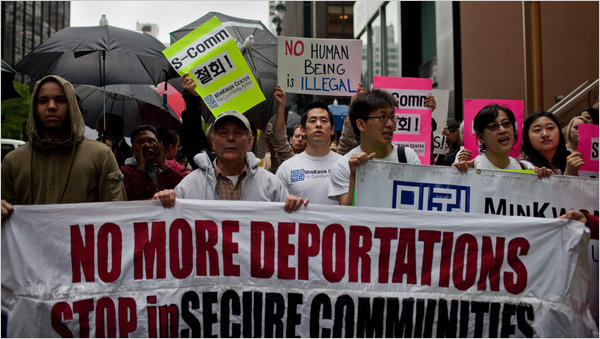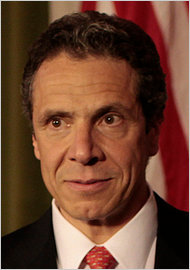Cuomo Ends State’s Role in Checking Immigrants

A May rally in Manhattan called for an end to the Secure Communities drive.
By KIRK SEMPLE
Gov. Andrew M. Cuomo said on Wednesday that he was suspending New York’s participation in a federal immigration enforcement plan that has drawn fire from immigrant advocates, civil liberties lawyers and elected officials in the state and around the country.
A statement from Mr. Cuomo’s office said there was “mounting evidence” that the program, called Secure Communities, had not only failed to meet its goal of deporting the most serious immigrant criminals but was also undermining law enforcement and compromising public safety.
“There are concerns about the implementation of the program as well as its impact on families, immigrant communities and law enforcement in New York,” Mr. Cuomo said. Unless those concerns are eased, the statement said, New York will not take part.
Mr. Cuomo’s decision makes New York the second state to announce its intention to withdraw from the program, and sets up a confrontation with the Obama administration, which has made Secure Communities a cornerstone of immigration enforcement strategy. Gov. Pat Quinn of Illinois said in May that he was canceling his state’s participation.
Under the program, begun by the Bush administration in 2008, the fingerprints of everyone booked into a local or county jail are sent to the Department of Homeland Security and compared with prints in its files. If officials find that a suspect is in the country illegally, or is a noncitizen with a criminal record, they may seek to deport the person.
By Wednesday, that fingerprint sharing had been introduced in about 41 percent of the nation’s jurisdictions, including 27 of 62 counties in New York. Mr. Cuomo’s move means that those counties’ participation will end. The entire country is scheduled to join the program by 2013.
The practical effects of Mr. Cuomo’s decision are unclear. New York law enforcement agencies regularly check fingerprints with the Federal Bureau of Investigation. Homeland Security officials said that regardless of New York’s participation in Secure Communities, the F.B.I. would still share fingerprints with the immigration agency.
Federal officials said that if states did not share fingerprints with the F.B.I., those states would lose access to federal criminal databases, undermining their ability to fight crime.
While Secure Communities has contributed to a sharp rise in deportations under President Obama, it does not appear to have won him many allies. It has angered immigrants who supported Democrats in recent elections. It has also failed to convince many of the president’s Republican opponents that he is sufficiently committed to enforcement.
Opponents of the program contend that even though it was mainly intended to ensnare convicted criminals and people deemed a security threat, it has instead caught too many immigrants charged with low-level crimes or guilty only of being in the country illegally. This pattern, the opponents argue, has driven immigrants deeper into the shadows and deterred them from helping officials fight crime.
In addition, critics have assailed the rollout of Secure Communities, which has been plagued by seemingly contradictory statements about how it works and whether local and state participation is voluntary.
Mylan L. Denerstein, counsel to Mr. Cuomo, cited these concerns in a letter on Wednesday.
“Until the numerous questions and controversies regarding the program can be resolved, we have determined that New York is best served by relying on existing tools to ensure the safety of its residents, especially given our overriding concern that the current mechanism is actually undermining law enforcement,” Ms. Denerstein wrote to John Sandweg, counsel to Janet Napolitano, the homeland security secretary.
Officials from Immigration and Customs Enforcement, an arm of Homeland Security that oversees Secure Communities, said it was reviewing the program to make sure it focused on criminals.
Immigrant advocates praised Mr. Cuomo. “It is clear the tide is turning” against Secure Communities, said Pablo Alvarado, director of the National Day Laborer Organizing Network in Los Angeles. “It’s high time for the president to terminate the program before any further damage is done to our communities.”
This article has been revised to reflect the following correction:
Correction: June 2, 2011
An earlier version of this article misstated Ms. Denerstein's gender.


